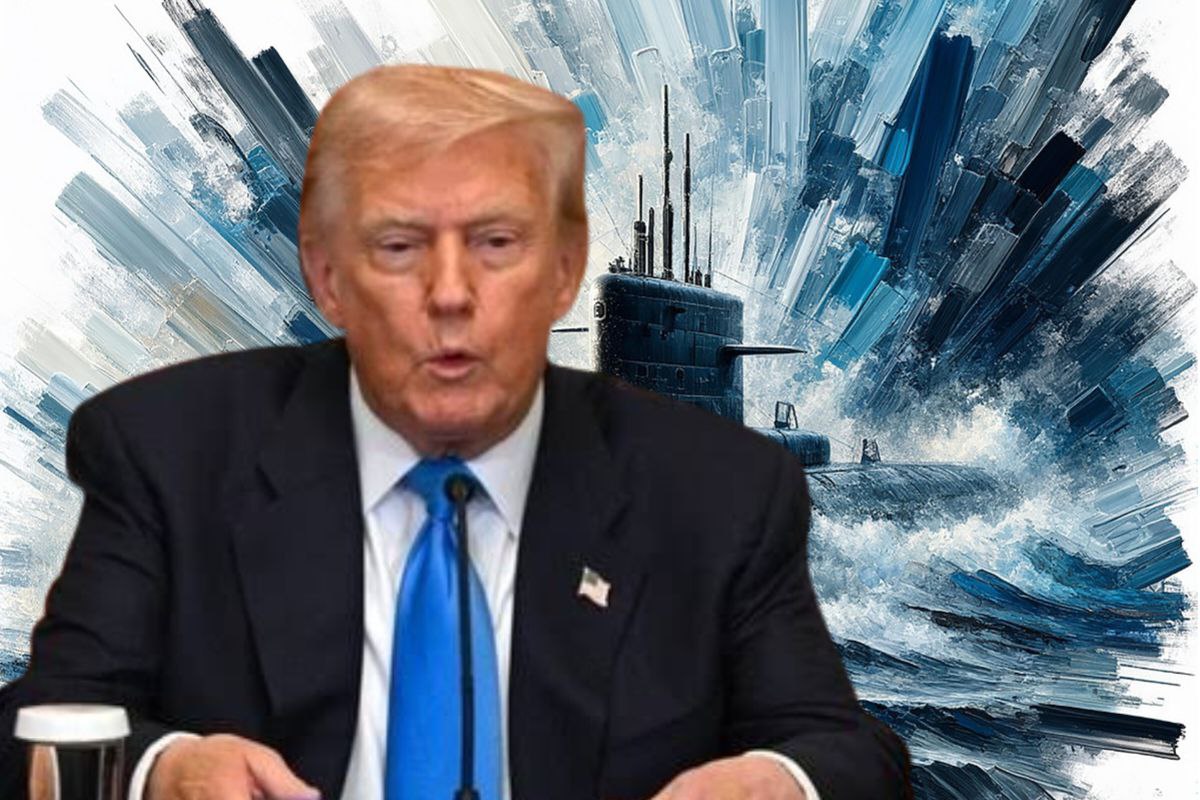President Donald Trump has ordered the deployment of two U.S. nuclear submarines following threatening remarks by former Russian President Dmitri Medvedev, escalating tensions between Washington and Moscow. The move comes days after the White House gave Russia a 10-day ultimatum to agree to a ceasefire in Ukraine or face new sanctions. While Medvedev reminded the U.S. of Russia’s nuclear capabilities, Trump responded with a show of force, raising global concerns.
Trump Orders Deployment of U.S. Nuclear Submarines
In a development that has stunned observers across global capitals, President Donald Trump has confirmed that he has ordered the deployment of two U.S. nuclear submarines to “appropriate regions” following escalating rhetoric between Washington and Moscow. The move comes in response to what Trump described as “foolish and inflammatory” remarks made by former Russian President and current Deputy Chairman of Russia’s Security Council, Dmitri Medvedev.

While Trump has not disclosed the exact locations or types of submarines being deployed, his statement on Truth Social indicated the move was made “just in case” Medvedev’s statements were more than just talk. “Words are very important and can often lead to unintended consequences,” Trump posted, adding, “I hope this will not be one of those instances.”
The situation began to intensify earlier this week when the White House issued an ultimatum to Russia, demanding a ceasefire in Ukraine within 10 days or face a new wave of harsh sanctions. The warning was swiftly met with a counter from Medvedev, who reminded the U.S. of Russia’s nuclear strike capabilities and accused the Trump administration of playing a dangerous “ultimatum game.” In his words, “Each new ultimatum is a threat and a step towards war, not between Russia and Ukraine, but between Russia and the United States.”
In his latest remarks, Trump condemned Russia’s actions in Ukraine, saying, “I think it’s disgusting what they’re doing.” This marked a notable shift in tone as Trump’s rhetoric has become more aggressive in recent days.
There is, however, ambiguity surrounding the nature of the submarines being deployed—whether they are nuclear-powered or armed with nuclear warheads. The U.S. Navy possesses more than a dozen nuclear-armed submarines, forming part of the strategic nuclear triad of air, land, and sea-based deterrents. These submarines are considered the most elusive and survivable part of America’s nuclear arsenal.
Despite the serious nature of Trump’s actions, senior U.S. officials have attempted to tone down the implications. Both the Secretary of State and the National Security Adviser dismissed Medvedev’s recent statements, suggesting that he is no longer a central figure in Russia’s decision-making. Nevertheless, the president’s actions stand in stark contrast, indicating he is treating the rhetoric from Medvedev with utmost seriousness.
Adding further complexity to the unfolding drama is the arrival of Trump’s special envoy, Steve Witkoff, in Russia. While his precise mission remains unclear, some speculate he may attempt backchannel diplomacy, possibly even meeting with Russian President Vladimir Putin. Russian media have reacted with surprise, with one outlet likening Witkoff to “a rabbit pulled from a magician’s hat”—the magician being Donald Trump. Whether Witkoff can diffuse the tension remains to be seen, but expectations are low.
Meanwhile, there has been no official response from the Kremlin or Russia’s foreign and defense ministries on nuclear submarines deployement but Local media and the public in Russia appear equally baffled by the sudden escalation. The Moscow stock market reacted sharply, falling significantly after news of the submarine deployment broke. According to observers, the most surprised individual may be Medvedev himself, who for years has made provocative and bombastic social media posts that were largely ignored—until now.
This latest geopolitical standoff Regarding nuclear submarines is unfolding against the backdrop of an imminent deadline. If Russia does not agree to a ceasefire in Ukraine by the end of next week, the U.S. is expected to impose a new round of sanctions not only on Moscow but potentially also on key trading partners like India and China.
Russian President Vladimir Putin, in contrast to Medvedev’s aggressive tone, adopted a more philosophical approach during a recent appearance with Belarusian President Alexander Lukashenko. Without referencing the U.S. directly, Putin said, “Disappointments only come from excessive expectations,” signaling a more restrained posture in public. About Deployement of nuclear submarines
As the countdown to the White House’s deadline continues, the world waits anxiously to see whether this diplomatic and military brinkmanship will escalate further or yield to negotiation. With nuclear submarines now reportedly en route and diplomatic engagement uncertain, the next few days could be pivotal for U.S.-Russia relations and global security.
Disclaimer:
This article is based on currently available reports and official statements on nuclear submarines as of August 2025. Geopolitical situations can evolve rapidly, and interpretations or decisions made by governments may change over time. The information presented here is for informational and journalistic purposes only and should not be considered as an official position or endorsement of any political entity or action. Readers are encouraged to follow updates from credible news sources and government announcements for the latest developments Reagards nuclear submarines.

